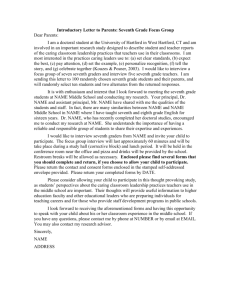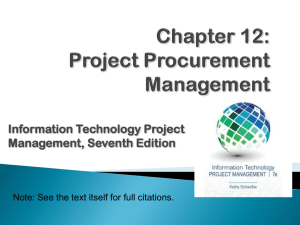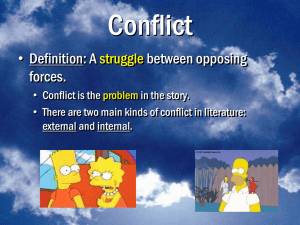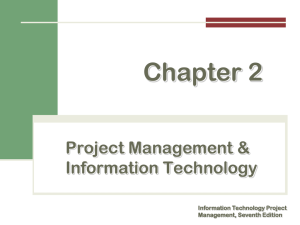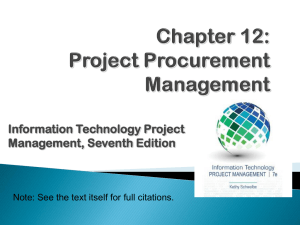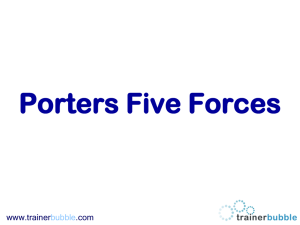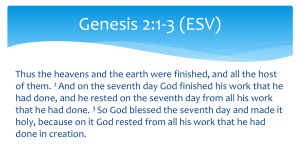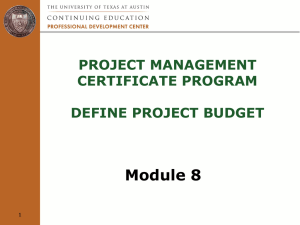12 - e-Portal
advertisement
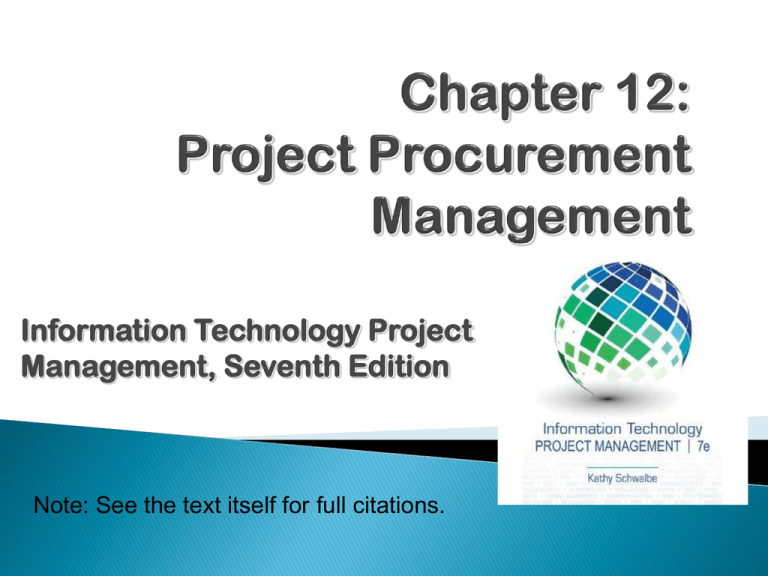
Information Technology Project Management, Seventh Edition Note: See the text itself for full citations. Understand the importance of project procurement management and the increasing use of outsourcing for information technology (IT) projects Describe the work involved in planning procurements for projects, including determining the proper type of contract to use and preparing a procurement management plan, statement of work, source selection criteria, and make-or-buy analysis Discuss how to conduct procurements and strategies for obtaining seller responses, selecting sellers, and awarding contracts Information Technology Project Management, Seventh Edition Copyright 2014 2 Procurement means acquiring goods and/or services from an outside source Other terms include purchasing and outsourcing Experts predict that global spending on computer software and services will continue to grow People continue to debate whether offshore outsourcing helps their own country or not Information Technology Project Management, Seventh Edition Copyright 2014 3 To access skills and technologies To reduce both fixed and recurrent costs To allow the client organization to focus on its core business To provide flexibility To increase accountability Information Technology Project Management, Seventh Edition Copyright 2014 4 A contract is a mutually binding agreement that obligates the seller to provide the specified products or services and obligates the buyer to pay for them Contracts can clarify responsibilities and sharpen focus on key deliverables of a project Because contracts are legally binding, there is more accountability for delivering the work as stated in the contract A recent trend in outsourcing is the increasing size of contracts Information Technology Project Management, Seventh Edition Copyright 2014 5 Project procurement management: Acquiring goods and services for a project from outside the performing organization Processes include: ◦ ◦ ◦ ◦ Planning procurement management: Determining what to procure and when and how to do it Conducting procurements: Obtaining seller responses, selecting sellers, and awarding contracts Controlling procurements: Managing relationships with sellers, monitoring contract performance, and making changes as needed Closing procurements: Completing and settling each contract or agreement, including resolving of any open items Information Technology Project Management, Seventh Edition Copyright 2014 6 Information Technology Project Management, Seventh Edition Copyright 2014 7 Identifying which project needs can best be met by using products or services outside the organization If there is no need to buy any products or services from outside the organization, then there is no need to perform any of the other procurement management processes Information Technology Project Management, Seventh Edition Copyright 2014 8 Different types of contracts can be used in different situations: ◦ ◦ ◦ ◦ Fixed price or lump sum contracts: Involve a fixed total price for a well-defined product or service Cost reimbursable contracts: Involve payment to the seller for direct and indirect costs Time and material contracts: Hybrid of both fixed price and cost reimbursable contracts, often used by consultants Unit price contracts: Require the buyer to pay the seller a predetermined amount per unit of service A single contract can actually include all four of these categories, if it makes sense for that particular procurement Information Technology Project Management, Seventh Edition Copyright 2014 9 Cost plus incentive fee (CPIF): The buyer pays the supplier for allowable performance costs plus a predetermined fee and an incentive bonus Cost plus fixed fee (CPFF): The buyer pays the supplier for allowable performance costs plus a fixed fee payment usually based on a percentage of estimated costs Cost plus percentage of costs (CPPC): The buyer pays the supplier for allowable performance costs plus a predetermined percentage based on total costs Information Technology Project Management, Seventh Edition Copyright 2014 10 Expected cost on contract (base on past experience) = $100K Share formula on contract for buyer & supplier = 85/15 Predetermined fee to supplier = $10K If final cost is $80K, then cost saving = expected cost – final cost = $20K Incentive bonus of supplier = (cost saving*15%)=$3K Buyer paid : predetermine fee + incentive bonus + final cost = $10K + $3K + $80K = $93K (saving of $7K compare with expected cost) Supplier receive : predetermine fee + incentive bonus = $10K + $3K = $13K If final cost is less then expected cost, both the buyer and the supplier benefit from a CPIF plan. (Win-Win) Copyright 2014 Information Technology Project Management, Seventh Edition Copyright 2014 12 Assume you can lease an item you need for a project for $800/day. To purchase the item, the cost is $12,000 plus a daily operational cost of $400/day How long will it take for the purchase cost to be the same as the lease cost? Information Technology Project Management, Seventh Edition Copyright 2014 13 Set up an equation so both options, purchase and lease, are equal In this example, use the following equation. Let d be the number of days to use the item: $12,000 + $400d = $800d Subtracting $400d from both sides, you get: $12,000 = $400d Dividing both sides by $400, you get: d = 30 If you need the item for more than 30 days, it is more economical to purchase it Information Technology Project Management, Seventh Edition Copyright 2014 14 Request for Proposals: Used to solicit proposals from prospective sellers ◦ A proposal is a document prepared by a seller when there are different approaches for meeting buyer needs Requests for Quotes: Used to solicit quotes or bids from prospective suppliers ◦ A bid, also called a tender or quote (short for quotation), is a document prepared by sellers providing pricing for standard items that have been clearly defined by the buyer Information Technology Project Management, Seventh Edition Copyright 2014 15 It’s important to prepare some form of evaluation criteria, preferably before issuing a formal RFP or RFQ Beware of proposals that look good on paper; be sure to evaluate factors, such as past performance and management approach Can require a technical presentation as part of a proposal Information Technology Project Management, Seventh Edition Copyright 2014 16 Deciding whom to ask to do the work Sending appropriate documentation to potential sellers Obtaining proposals or bids Selecting a seller Awarding a contract Information Technology Project Management, Seventh Edition Copyright 2014 17 Organizations often do an initial evaluation of all proposals and bids and then develop a short list of potential sellers for further evaluation Sellers on the short list often prepare a best and final offer (BAFO) Final output is a contract signed by the buyer and the selected seller Information Technology Project Management, Seventh Edition Copyright 2014 18
